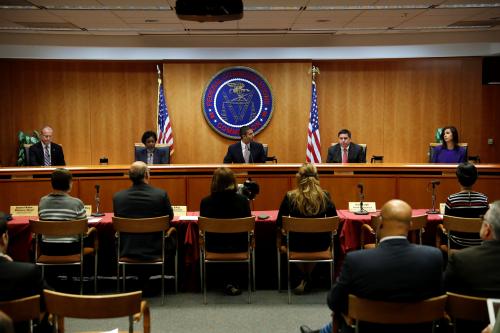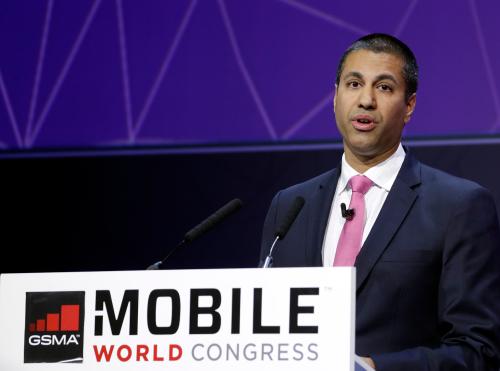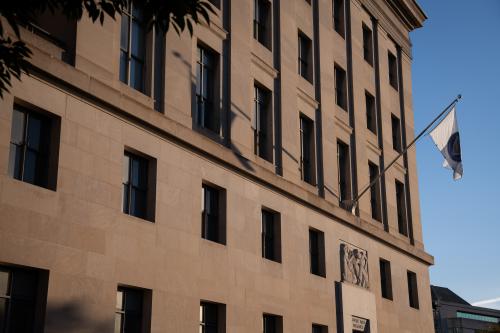Last week, the Federal Communications Commission’s (FCC) web site reportedly crashed after late night television host John Oliver told viewers to flood the comments system in support of net neutrality, which calls for all internet traffic to be allowed equal access by internet service providers.
Meanwhile on Capitol Hill, Senator Mike Lee, R-Utah introduced legislation to nullify Obama-era regulations established through the FCC 2015 Open Internet Order, which reclassified broadband service providers as telephone companies under Title II of the outdated 1934 Communications Act.
Both actions exemplify the strong tides of dissent over who controls the internet and reveal the differences in perspectives and the approach around internet regulations. With the looming FCC repeal of the 2015 Order, Chairman Ajit Pai’s ultimate goal is to return the Commission to a light-touch regulatory approach to broadband in order to stimulate the necessary conditions to reach new digital milestones, including the anticipated rollout of 5G wireless infrastructure.
Despite the chairman’s intentions, the issue will remain gridlocked. Net neutrality advocates and opponents alike have demonstrated their steady investment in a specific outcome that juxtaposes regulation over no regulation. These deep seated divisions are played out among members of Congress, industry leaders, activists, and even academics.
Given the tumultuous history of net neutrality at the FCC, the future of internet regulations will remain uncertain in the U.S. Today’s decisions will be vulnerable to challenges from a possible Democratic administration and potentially overturned if argued before the Supreme Court.
Congress may be the only entity that can offer a more permanent solution to what is driving the debate – adherence to the principles of an open internet and the application of the appropriate legal authority. As the FCC works on its repeal, Congress should exercise leadership to identify a legislative solution that marries – rather than polarizes – these two perspectives to reach bipartisan agreement. Clearly, a congressional solution cloaked in partisanship will not be the starting place for such negotiations.
What Both Sides Are Saying
On one side of the net neutrality debate are advocates that deem internet openness as fundamental to civil liberties and free speech. Deferring to Tim Wu’s inaugural definition of net neutrality, this camp believes that the government must ensure that the internet is free from discrimination, allowing all types of content and companies a fair chance for distribution and access. Among these stakeholders, telecom incumbents are the culprits and are perceived as online gatekeepers that absent of regulation, will engage in anti-competitive and unfair business practices that harm consumers and other content creators. Some advocates have also suggested that citizens will become targets of increased surveillance without net neutrality.
On the other side are Trump’s FCC and a range of industry and pro-market supporters who conclude that too much government intervention has stifled internet freedom, resulting in decreased broadband network investment, innovation, and competition.
The FCC has offered some replacement language in their repeal, which some net neutrality advocates have already opposed. In the interest of preserving the tone of the 2015 Order’s bright line rules, the FCC will solicit public comment on their relevancy, especially those that prohibit companies from blocking and throttling content. In the same notice, the FCC is expected to request input on banning paid prioritization, or internet “fast and slow lanes,” particularly due to the perceived commercial and public interest value.
The current FCC proposal leads with the reversal of the Title II reclassification of broadband service providers that now subjects them to outdated and limited telephone regulations. According to the chairman, Title II has handcuffed the broadband marketplace, which in turn has deprived consumers of more competitive service offerings, like unlimited data and increased deployment. The rules have also been associated with maintaining the digital divide and exacerbating digital redlining (where the private sector does not provide service in certain communities) because companies have fewer resources to invest. In the FCC proposal, broadband service providers would voluntarily comply with the agreed upon bright line rules, which advocates have loudly contested.
The FCC also challenges the appropriateness of its authority and seeks to recuse itself from having oversight over the issue. Instead, the agency wants to empower the Federal Trade Commission (FTC) with jurisdiction. Despite the FCC’s long dealings with this issue, the proposal suggests that the FTC is more suited to monitor and enforce the activities of broadband service providers once their designation as common carriers under Title II is rescinded. (The Ninth District Court recently ruled to rehear the FTC v. AT&T case that also limited the agency’s authority over common carriers.)
Another element of the FCC proposal is the elimination of the “internet conduct standard,” a clause in the Communications Act that enables agency review and adjudication of business practices on a case-by-case basis. Here, the FCC wants to more broadly divest its authority over broadband service providers, which calls into question the handling of more technical concerns such as network management.
At a glance, the FCC’s proposed policy obscures two sticking points for net neutrality advocates – consumers and their protections. And not surprisingly, the FCC proposal mirrors the approach of Republicans who have been attempting to strip the agency’s authority for years.
Moving toward a Legislative Solution
Over the years, Congress has struggled to find bipartisan support on this issue. In 2010, retired Congressman Henry Waxman’s, D-CA, legislative solution did not rely upon Title II authority, but codified a series of bright line rules with enforcements. Tracking a proposal made by competing industries, he also supported case-by-case oversight of business practices.
In 2015, ranking Senator John Thune, R-SD, introduced legislation to protect the open internet that reversed Title II and stripped the FCC of its legal authority after the adoption of the current Order. Announcing his intent to re-introduce the language earlier this year, bipartisan efforts have been dormant and given the current Republican offense, will probably stay that way.
During a Commerce Committee hearing this month, ranking Senator Bill Nelson, D-FL, shared a small portion of optimism for compromise, even amid his belief that the chances for cooperation are improbable at a time of amplified public differences.
Given the history, is legislation possible?
Unfortunately, Congress cannot remain gridlocked on this issue given their constituents’ reliance on the digital economy. Citizens are increasingly leveraging the internet and other new technologies for employment, entrepreneurship, health care, education, civic engagement, and other critical functions. Elected officials must start the negotiations in radical agreement on internet openness, given that the digital economy will continue to face broadband capacity challenges (i.e., spectrum and infrastructure concerns) as demand for services rises.
As such, Congress should delve into the question of legal authority conditioned not on emotion or political party, but on the most appropriate and sustainable framework for its application. Under this scenario, a bipartisan agreement could abandon Title II based on its outdated and perfunctory application to the online economy and focus on codifying the bright line rules through statute. A compromise might also include an additional bright line rule that offers consumers a formal means for complaint and adjudication at the Commission. Or FCC authority can perhaps be shared with the FTC: making one agency the cop on the beat over behavioral and commercial practices (FTC) and the other over technical misgivings and other consumer concerns (FCC).
While the details will matter, Congress, working together, can generate a more balanced and permanent solution to net neutrality. Given the dogma emanating from both sides, this calm after the storm would bring some certainty about the internet’s future to consumers, government, industry, activists, and all others.
The Brookings Institution is committed to quality, independence, and impact.
We are supported by a diverse array of funders. In line with our values and policies, each Brookings publication represents the sole views of its author(s).







Commentary
Why net neutrality needs a congressional solution
May 17, 2017